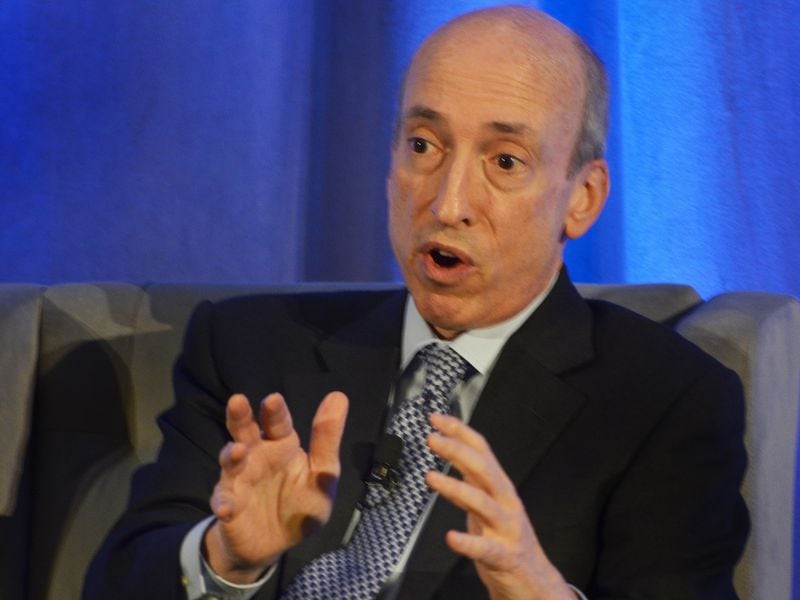
It’s strange to think now how crypto received Gary Gensler as he became Securities and Exchange Commission chair in 2021. At the time, he was a breath of fresh air for an industry that badly needed change. His SEC predecessor, Jay Clayton, had seemed largely disinterested in digital assets, whereas Gensler had taught courses on blockchain at MIT. He was supposed to get it. And being a person who got it, we thought, he would surely find a sensible way between the need to uphold existing law and allowing a promising industry to grow.
How wrong we were.
This is an excerpt from The Node newsletter, a daily roundup of the most pivotal crypto news on CoinDesk and beyond. You can subscribe to get the full newsletter here.
These days, nearly everyone in crypto, or close to it, dislikes Gensler’s tenure. He hasn’t provided any legal clarity to token issuers, many say; he hasn’t helped Congress fashion any new crypto-focused legislation (just look at the docket); he’s wound up a lot of people as he pushed an agenda that often seems self-interested and self-centered.
This week, Fortune Magazine took a deep look at Gary’s time at the SEC and put meat on what many of us already know in outline. It’s a great piece based on interviews with “more than 30 financial experts, politicians, and current and former employees from all levels at the SEC and Commodity Futures Trading Commission, including agency leaders,” and you should read it. But, in case you don’t have time, we’ll summarize a few of the takeaways here, especially as they relate to crypto.
He may be a regulator, but he acts more like a politician.
Gary Gensler previously served as CFTC chairman, taking the reins of a backwater agency following the 2008 financial crisis. He lobbied to expand that agency’s powers in legislation enacted at the time, pushing a raft of new rules and creating office space for CFTC staffers across the country (much of which was left empty because of budget constraints). In 2016, he joined Hillary Clinton presidential campaign and then tied his fortunes to Sen. Elizabeth Warren (D-MA), who then, as now, leads a movement to crack down on Wall Street and crypto.
Now, he apparently has his eyes on becoming Treasury Secretary when the position becomes open again. “The running rumor in D.C. is that Gensler has had his eyes on becoming Treasury secretary since the Obama administration. That assumption was repeated in nearly every interview with Fortune, although always tiptoed around by his allies,” writers Leo Schwartz and Jeff John Roberts say.
Allies and critics all agree on Gensler’s ambition. “Gary Gensler is a politician masquerading as a regulator,” Ritchie Torres, a Democratic congressman who supports the crypto industry, told Fortune.
In the absence of new legislation from Congress, Gensler has looked to existing laws to regulate the financial sector. That has led to a spate of rule-making from his office, covering areas as diverse as crypto and the way companies report their climate change liabilities. But much of that agenda now apparently appears bogged down in lawsuits and other challenges.
Per Fortune:
“Finalizing rules has turned into a headache for Gensler. According to the Securities Industry and Financial Markets Association, Gensler issued 62% and 91% more rule proposals, respectively, than his two most recent predecessors in his first 30 months in office — ranging from how broker-dealers can use predictive analytics about clients to a partial overhaul of the U.S. trading system. Such undertakings require comment periods to solicit industry feedback, however, and Gensler’s ambition has drawn pushback from across the financial world. In August, Bloomberg reported that Gensler’s record of getting his rules adopted was the slowest in decades.”
Gensler’s enforcement actions, meanwhile, have often been hamstrung by lawsuits brought by the companies the SEC has targeted. Ripple (largely) beat back an effort to class XRP as a security that predated Gensler’s tenure. Now Coinbase seems to have a good chance of stymying another action claiming that it operates an illegal securities exchange. Citing legal experts, Fortune said Gensler’s aggressive approach could end up backfiring. “Litigation over the SEC’s jurisdiction and others could short-circuit Gensler’s broader agenda, if such suits lead to judicial rulings that curb the agency’s powers,” the authors write.
Gensler ran and built up the CFTC, but he’s seeking to limit its remit when it comes to crypto. By arguing that most tokens, bar bitcoin, are securities, Gensler makes the SEC responsible for enacting how those tokens should and shouldn’t be regulated. The CFTC argues that some tokens are more properly commodities, and therefore should be regulated by that agency.
The “commodity-vs.-security debate” isn’t just a matter for the crypto industry, in other words; it matters for regulators and their agencies, often leading to “discord between Gensler’s current agency and his old one,” Schwartz and Roberts said.
Speaking to Fortune, Summer Mersinger, a CFTC commissioner, cites the case of a Coinbase employee who was caught insider-trading. The CFTC wanted to bring its own action, based on its understanding that some of the tokens involved were commodities. The SEC claimed jurisdiction for itself, leading Mersinger to worry that the lawsuit could be thrown out because of uncertainty over which agency held sway. She said relations between the SEC and CFTC are now “more than a little bit strained.”
A CFTC staffer puts it more forcefully. “It’s like a horrible, dysfunctional marriage,” the person told Fortune. “Cooperation between our enforcement and their enforcement is essentially gone.”
免责声明:本文章仅代表作者个人观点,不代表本平台的立场和观点。本文章仅供信息分享,不构成对任何人的任何投资建议。用户与作者之间的任何争议,与本平台无关。如网页中刊载的文章或图片涉及侵权,请提供相关的权利证明和身份证明发送邮件到support@aicoin.com,本平台相关工作人员将会进行核查。




